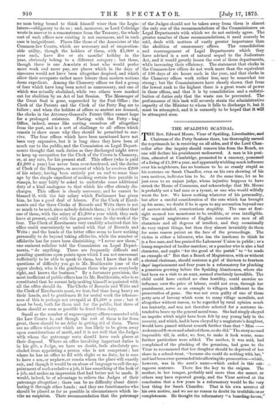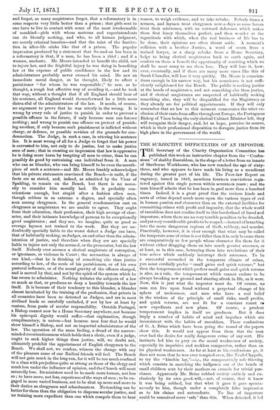THE SPALDING SCANDAL.
THE Rev. Edward Moore, Vicar of Spalding, Lincolnshire,and
Chairman of the Petty Sessions there, has thoroughly earned the reprimands he is receiving on all sides, and if the Lord Chan- cellor after due inquiry should remove him from the Bench, no one will declare his punishment undeserved. A man in his posi- tion, educated at Cambridge, promoted to a canonry, possessed of a living of /1,200 a year, and apparentlyvrielding much influence over his neighbours, has no business to be so crassly stupid as his sentence on Sarah Chandler, even on his own showing of his own motives, indicates him to be. At the same time, let us be just even to an unjust judge, whose injustice happens to have struck the House of Commons, and acknowledge that Mr. Moore is probably not a bad man or a tyrant, or one who would wilfully wrest the law. We know nothing whatever of his personality, but after a careful consideration of the case which has brought up his name, we doubt if he is open to any accusation beyond one of narrow-minded, conscientious stupidity. The case at first- sight seemed too monstrous to be credible, or even intelligible. The unpaid magistrates of English counties are men of all characters and all degrees of intellect, and they occasionally do very unjust things, but then they almost invariably do them for some reason patent on the face of the proceedings. The victim is either a labourer, who has the insolence to think he is a free man, and has praised the Labourers' Union in public ; or a tramp suspected of lucifer-matches; or a poacher who is also a bad character, and ought "for the good of the parish" to "be made an example of." But that a Bench of Magistrates, with or without a clerical chairman, should sentence a girl of thirteen to fourteen days' imprisonment and four years in a reformatory for plucking a geranium growing before the Spalding Almshouses, where she had been on a visit to an aunt, seemed absolutely incredible. The child could have excited no class hostility, could exercise no influence over the price of labour, could not even, through her punishment, serve as an example to villagers indifferent to the preservation of game. She was not even guilty of one of those petty acts of larceny which seem to many village moralists, not altogether without reason, to be regarded by rural opinion much too leniently, and was not therefore selected for a sentence in- tended to brace up the general moral tone. She had simply obeyed an impulse which might have been felt by any young lady in the country, and which, had it been obeyed by a magistrate's daughter, would have passed without remark further than that "Miss
understood flowers and admired them, so she did." The story seemed impossible till, in order, we fear, to make it look worse, some further particulars were added. The mother, it was said, had complained of the plucking of the geranium, had gone to the Vicar to recommend that her daughter should be deprived of her share in a school-treat, "because she could do nothing with her," and had been over-persuaded into allowing the prosecution—which, however, was in the aunt's name—which ended in this out- rageous sentence. There lies the key to the enigma. The mother, in her temper, probably said more than she meant, or others may have repeated gossip, and the Vicar arrived at the conclusion that a few years in a reformatory would be the very best thing for Sarah Chandler. That is his own account of his own motive, and we see no reason to doubt its truthfulness or completeness, He thought the reformatory "a boarding-house," and forgot, as many magistrates forget, that a reformatory is in some respects very little better than a prison ; that girls sent to one have to live in contact with some of the most irredeemable of mankind—girls with whom matrons and superintendents can do literally nothing, and who, to all human judgment, are merely criminal lunatics—and that the taint of the Institu- tion in after-life sticks like that of a prison. The popular impression produced by a statement that So-and-so has been in a reformatory is that, if a man, he has been a thief ; and if a woman, unchaste. Mr. Moore intended to benefit the child, not to injure her, and the frightful injury he was doing in benefiting her at the expense of public confidence in the law and its administrators probably never crossed his mind. He saw an immediate moral danger, as he thought, likely to affect a parishioner "for whom he was responsible ;" he saw, as he thought, a rough but effective way of avoiding it,—and he took that way, without a thought that if all England should hear of his sentence, all England would thenceforward be a little more distruttful of the administrators of the law, it needs, of course, no argument to prove that he was utterly in the wrong. It is wrong by every rule of justice to punish in order to prevent a possible offence in the future, if only because man can foresee nothing ; and wrong to punish one offence on pretext of punish- ing another, if only because such punishment is inflicted without charge, or defence, or possible revision of the grounds for con- demnation. The Judge, in such a case, in uttering his sentence lies. It is most wrong of all for a Judge to forget that his power is entrusted to him, not only to do justice, but to make justice seen of men ; that in creating an impression that law is oppressive he is doing more harm by tempting all men to crime, than he can possibly do good by restraining one individual from it. A man who can so blunder, who can bring himself to be even the mouth- piece of such a sentence—and Mr. Moore frankly acknowledges that his private statements convinced the Bench—is unfit, if the facts are as stated, and, indeed, as admitted by the Vicar of Spalding, to remain on the Bench, but there is no neces- sity to consider him morally bad. He is probably con- scientious enough, but stupid after a fashion often seen, though seldom in so extreme a degree, and specially often seen among clergymen. In the general condemnation cast on clergymen as magistrates we are unable to agree. They ought from their education, their profession, their high average of char- acter, and their intimate knowledge of persons to be exceptionally good magistrates ; and they are, we imagine, quite as good as average laymen not trained to the work. But they are un- doubtedly specially liable to the worst defect a Judge can have, that of habitually seeking, as Judges, an end other than the admin- istration of justice, and therefore when they err are specially liable to injure not only the accused, or the prosecutor, but the law itself. Nobody ever accuses a clerical magistrate of corruption, or ignorance, or violence in Court ; the accusation is always of one kind,—that he is thinking of something else than justice according to law, of the souls of his parishioners, or of his own pastoral influence, or of the moral gravity of the offence charged, and is moved by that, and not by the spirit of the system which he has sworn to administer. Nothing irritates the subjects of a law so much as that, or produces so deep a hostility towards the law itself. It is because of their tendency to this blunder, a blunder almost inculcated by the training of the profession, that priests in all countries have been so detested as Judges, and are in most civilised lands so carefully excluded, if not by law at least by custom, from posts of secular responsibility. Outside Portugal, a Bishop cannot now be a Home Secretary anywhere, not because his episcopal_ dignity would suffer—that explanation, though complimentary, is untrue—but because men fear that he would show himself a Bishop, and not an impartial administrator of the law. The operation of the same feeling, a dread of the narrow- minded conscientiousness which holds that a cleric, even if a judge, ought to seek higher things than justice, will, we doubt not, ultimately prohibit the appointment of English clergymen to the Bench. We shall not, we confess, witness the change with any of the pleasure some of our Radical friends will feel. The Bench will not gain much in the long run, for it will be too much confined to a class with prejudices quite as strong as those of the clergy and much less under the influence of opinion, and the Church will most assuredly lose. Its ministers need to be made more human, not less so ; to have more, not less, experience of the ways of men ; to be en- gaged in more varied business, not to be shut up more and more to their duties as clergymen and schoolmasters. No teaching can be better for them than the obligation to dispense secular justice, and no training more expedient than one which compels them to hear reason, to weigh evidence, and to take rebuke. Nobody hisses a sermon, and laymen treat clergymen now-a-days as some lovers treat their mistresses, with an outward deference which makes them first fancy themselves perfect, and then wonder at the ingratitude with which, when the real business of life has to be done, their opinions are often thrust aside. A moment's collision with a brother Justice, a word of scorn from a trained lawyer, or a sharp rebuke from a Home Secretary, helps to bring clerical magistrates back to earth again, and confers on them a benefit the opportunity of receiving which we shall be most sorry to see them lose. They will lose it, how- ever, eventually, and if there are many more cases like this of Sarah Chandler, will lose it very quickly. Mr. Moore is conscien- tious enough in his narrow way, but his conscience is not suffi- ciently enlightened for the Bench. The public is seeking justice at the hands of magistrates, and not something else than justice, and if clerical magistrates are suspected of habitually seeking something else, they will be disqualified for the Magistracy as they already are for political appointments. If they will only remember that no law to this moment consecrates the utter ex- clusion of their caste from office throughout Europe, the Portuguese Bishop of Vizen being the only clerical Cabinet Minister left, they will recognise their danger, and, let us hope, perceive its source, which is their professional disposition to derogate justice from its high place in the government of the world.



































 Previous page
Previous page